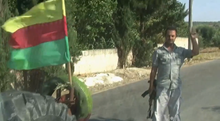Damage to the Afrin region of Syria reportedly caused by Turkish forces.
Civilians have been killed, their neighborhoods destroyed and at least one water treatment plant heavily damaged in the Turkish military offensive against the Kurdish-held Syrian enclave of Afrin, according to video, photos and on-the-ground accounts reviewed by Fox News.
Some of the reporting, which included the apparent deaths of children, is too graphic to publish. Some of the accounts of what is happening in Afrin also cannot be independently verified.
The Turkish intervention, called “Operation Olive Branch,” began in late January and, according to national security specialists, further complicates the conflict in Northern Syria involving Kurdish forces that worked with the United States to rout the Islamic State (ISIS).
“The Turkish attempt to drive the Kurds from Afrin places the U.S. in a very difficult position,” said Tara Maller, a former military analyst for the CIA who is now a senior policy adviser with the Counter Extremism Project. “If the U.S. is seen as abandoning the Kurds, its allies and the most effective fighting force against ISIS, it could result in the loss of credibility and an unwillingness for others to cooperate with the U.S. in the future against ISIS and other terrorist groups.”
While some 2,000 U.S. forces are in the region, Turkey has threatened to clear the Kurds from its border with Syria. The strategy could impact the town of Manbij, widely reported to be a base for U.S. troops.
Maller, who reviewed photos and video for Fox News, said that “there are U.S. troops in this area, in physical proximity to the fighting. The U.S. has said it is not moving its forces from this area and would hit back hard if attacked. At the same time, the U.S. wants to avoid alienating Turkey and pushing it further into Russia’s sphere of influence. The U.S. must work through diplomatic channels to lessen the tension in the area and prevent this confrontation from drawing in other players and becoming a separate war, which will only embolden ISIS and other radical groups.”
Afrin is home to the People’s Protection Units, or YPG, a Kurdish militia. The Turkish government maintains the YPG is a terrorist group and offshoot of the Kurdistan Workers Party (PKK), which has waged a military struggle against Turkey since the 1980s. At the same time, however, YPG is a central element of the U.S.-backed Syrian Democratic Forces that now control great swaths of Syria.
Returning from overseas last week, U.S. Defense Secretary James Mattis gave a wide-ranging brief to reporters, one that touched on the Afrin conflict. Mattis said Secretary of State Rex Tillerson had recently visited the Turkish capital, Ankara, where he dealt with issues “causing friction” and a “loss of rapport between us and our NATO ally Turkey.”
Mattis continued. “And while we understand their (Turkey’s) legitimate security concerns, as I’ve mentioned several times, that does not align with us concurring with attacks into areas that were not sources of violence before the attack into Afrin, for example.”
Asked how “mechanisms” would work with Turkey in Afrin and Manbij, he said: “That’s exactly what we have to work out. That’s — as you said, we’re going to put them in place. So there’s a commitment now to work them out. We have to put them — we have to draw them up together, and then we have to employ them.“
The aim of the Turkish operation is to “stop attacks and border harassments, indiscriminate shelling of urban areas, harboring, equipping and training of terrorists, suicide bombers and assassins,” according to a fact sheet sent to Fox News from the Turkish Embassy in Washington. Turkey also maintains that “all precautions are taken to avoid collateral damage to the civilian population” in the operation, a claim sharply disputed by Kurdish groups.
At the Munich Security Conference this month, Turkey’s minister of foreign affairs called Operation Olive Branch a “legitimate right (for) self-defense,” adding that “supporting a terrorist organization against another terrorist organization (ISIS) is a big mistake and risking the future of the country,” a reference to the YPG.
Maller, of the Counter Extremism Project, said ISIS has been beaten back, but emphasized that the terror group would likely stage a comeback, and the U.S. will need its Kurdish allies again. “ISIS continues to have a formidable presence” along the Syria-Iraq border and “is capable of striking quickly and often. Also, ISIS continues to successfully radicalize and recruit individuals globally, while inspiring followers to carry out attacks. Over time, it is quite possible that ISIS could again gain strength, as it has done before, should the war in Syria drag on and Iraq’s government remain weak and under the sway of Iran.
“While the absolute number of ISIS fighters in Syria and Iraq may have fallen, the group remains dangerous and continues to spread to Africa, Asia and other parts of the world.”
Catherine Herridge is an award-winning Chief Intelligence correspondent for FOX News Channel (FNC) based in Washington, D.C. She covers intelligence, the Justice Department and the Department of Homeland Security. Herridge joined FNC in 1996 as a London-based correspondent.


 The arrest in a Prague hotel of former Syrian Kurdish PYD (Democratic Union Party) leader
The arrest in a Prague hotel of former Syrian Kurdish PYD (Democratic Union Party) leader 










 The group was founded in 1978 by a group of Kurdish students led by Abdullah Öcalan.] The PKK’s ideology was originally a fusion of revolutionary socialism and Kurdish nationalism, seeking the foundation of an independent, Marxist–Leninist state in the region, which was to be known as Kurdistan.
The group was founded in 1978 by a group of Kurdish students led by Abdullah Öcalan.] The PKK’s ideology was originally a fusion of revolutionary socialism and Kurdish nationalism, seeking the foundation of an independent, Marxist–Leninist state in the region, which was to be known as Kurdistan.